How Pickles the dog found the World Cup trophy - 50 years on
- Published
Witness: Pickles and the Stolen World Cup
Heard the one about the dog who helped England win the World Cup?
Triumphant on home soil in 1966, the Three Lions have yet to reach such heights again but do have a chance to reminisce when they face current world champions Germany, the beaten finalists at Wembley 50 years ago, in Berlin on Saturday.
However, that iconic image of Bobby Moore lifting the Jules Rimet trophy could have been very different but for the crucial intervention of a mixed breed collie called Pickles.
Fifty years ago this weekend, the Football Association was left panicking over the theft of the World Cup less than four months before the tournament was due to begin.
Step forward, Pickles.
'The whole thing was amateurish'
The Jules Rimet trophy was on display at a stamp exhibition in central London but on Sunday, 20 March - just the second day it was on show - it was taken from its case, external in Westminster's Central Hall.
With the security guards absent on a break, the exact circumstances of how the cup was taken remain a mystery.
"The idea there were people by the display case all the time is just not true," said Doctor Martin Atherton, author of the book 'The Theft of the Jules Rimet Trophy'.
"The whole thing was amateurish - the fact the FA let the trophy out, the security arrangements and the whole recovery of the trophy.
"It came out one of the security guards was 74 years old or something. The security was quite inadequate.
"We think two people broke in through an emergency exit, took the trophy and walked out again."
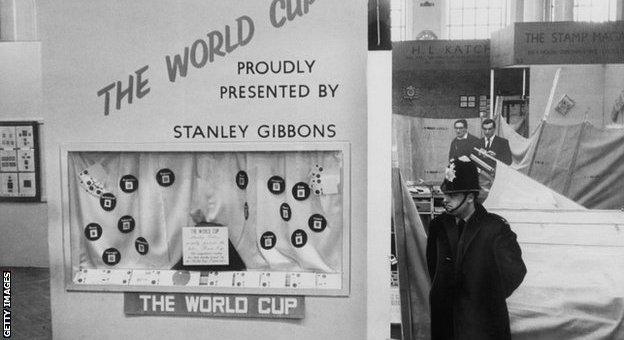
The Jules Rimet Trophy, valued at £3,000, was taken from its display case at the Stampex exhibition in March 1966
Ransom note
Police at Scotland Yard took control of the investigation but had few leads.
"There were two separate descriptions of two clearly different people - a tall person and a short person," said Atherton.
"The description the police put out was an amalgamation of the two."
In the meantime, the FA secretly commissioned a replica of the trophy to be made by silversmith George Bird.
A ransom note for the trophy, external was received by then FA chairman Joe Mears, signed by someone called Jackson, demanding £15,000.
On police advice Mears, who was also chairman of Chelsea, pretended to agree to the deal.
An undercover policeman met Jackson - who was really a former soldier called Edward Betchley - in Battersea Park with a suitcase stuffed with newspapers covered with a layer of £5 notes, and Betchley was eventually arrested.
A chance discovery
With the trophy still missing despite Betchley's arrest, the crucial moment of discovery came on the evening of Sunday, 27 March.
Dave Corbett left his flat in Norwood, south London, to make a phone call and take his dog Pickles for a walk. Little did he know they were about to hit international headlines.
"Pickles was running around over by my neighbour's car," explained Corbett.
"As I was putting the lead on I noticed this package laying there, wrapped just in newspaper but very tightly bound with string.
"I tore a bit off the bottom and there was a blank shield, then there were the words Brazil, West Germany and Uruguay printed.
"I tore off the other end and it was a lady holding a very shallow dish above her head. I'd seen the pictures of the World Cup in the papers and on TV so my heart started thumping."
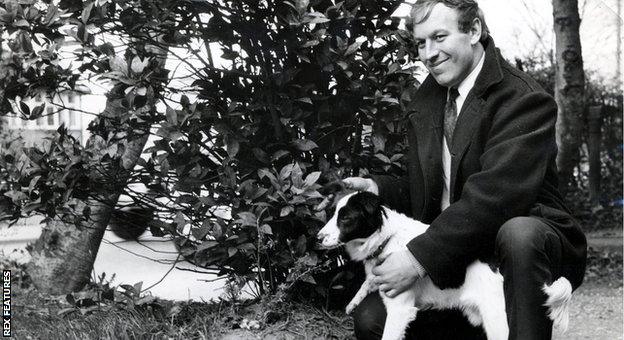
Pickles found the World Cup trophy after his owner Dave Corbett left his flat to make a phone call
Not 'World Cuppy'
Corbett went to his local police station to present the trophy and was initially met with disbelief.
"I slammed it on the desk in front of the sergeant and said 'I think I have found the World Cup'.
"I remember his words: 'Doesn't look very World Cuppy to me, son'.
Eventually, a detective was summoned and Corbett was taken to Scotland Yard for questioning.
"It suddenly dawned on me that I was number one suspect," he added.
"After an hour or so they ran me back home. When I got back to Norwood there was all the world's press outside."
Once the police cleared him of any wrongdoing, Corbett - and in particular Pickles - became the subject of the international media spotlight.
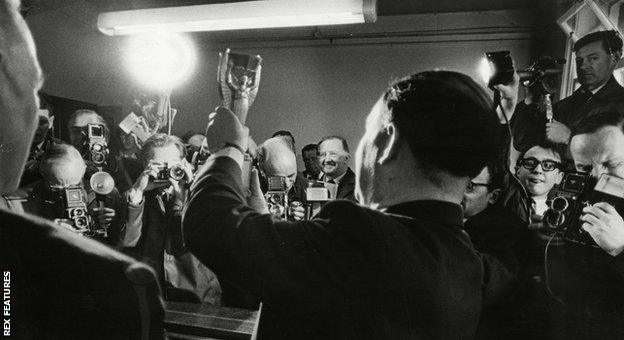
Police display the Jules Rimet trophy to the press in London following its discovery by Pickles
A role on film and angry women
Pickles was awarded a medal by the National Canine Defence League and received several other rewards.
The collie became a TV star and even appeared in a film with Eric Sykes called The Spy with a Cold Nose.
"He won Dog of the Year, Italian Dog of the Year and appeared on television on Blue Peter and Magpie," said Corbett, now 76.
"He lapped it up and was perfect under the lights.
"He was invited to most countries in the world but in those days it was six months' quarantine when you came back."
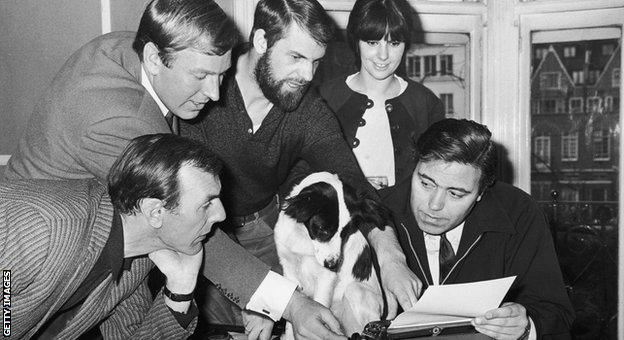
On the back of his fame Pickles got a role in the 1966 film The Spy with a Cold Nose, starring Eric Sykes (bottom left)
Corbett, meanwhile, got pay-outs from sponsors and the cup's insurers, which totalled almost £5,000.
The pair were invited to a celebratory dinner after England beat West Germany 4-2 following extra time in the final.
"We went into the hotel with all these celebrities and Pickles walked over to the lift shaft and did a wee. I felt so embarrassed," recalled Corbett.
"All the wives of the footballers were there but they weren't invited up to the main reception. I have never met so many angry women.
"Afterwards, the England team went out on to a balcony and the street was full of people. We went with them and Bobby Moore picked Pickles up and showed him to the crowd, and there were cheers."
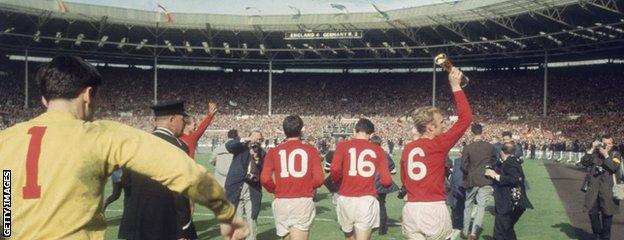
The FA were so concerned about the Jules Rimet trophy going missing again they arranged for policeman Peter Weston to switch the original with Bird's replica during England's post-match celebrations at Wembley
An unfortunate end
Corbett bought a house in Surrey with his reward money and was a prosecution witness at the trial of Betchley, who was subsequently sent to jail.
However, Pickles did not live much longer to bask in his newfound fame - passing away in 1967.
"He was a perfect dog, except he didn't like cats," said Corbett.
"He was outside with my son and had a choke-chain on when a cat shot across the alleyway. Pickles pulled the boy, he let the lead go and the dog went away.
"We were looking everywhere and at the back of garden there was a tree and he was halfway up there. I think he must have broken his neck."
Pickles is now buried at the bottom of Corbett's garden in Lingfield.
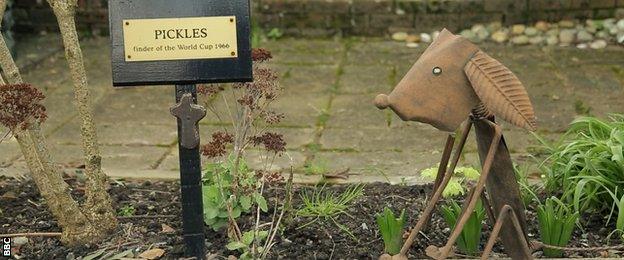
Pickles was buried in Corbett's garden with a plaque which reads: Pickles - finder of the World Cup 1966
As for the Jules Rimet trophy, it was given to Brazil following their third triumph in the competition in Mexico in 1970.
However, it was stolen from the Brazilian Football Confederation's building when it was on display in 1983 and never recovered. It is believed that it was melted down for gold.
The replica, returned to Bird and kept in a box under his bed until his death, was bought at auction by world governing body Fifa in 1997 and is now in the National Football Museum, external in Manchester.
Have you added the new Top Story alerts in the BBC Sport app? Simply head to the menu in the app - and don't forget you can also add score alerts for your football team and more.
- Attribution
- Published23 March 2016
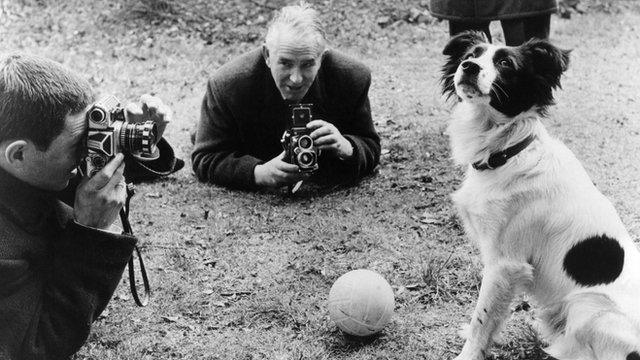
- Published16 May 2014
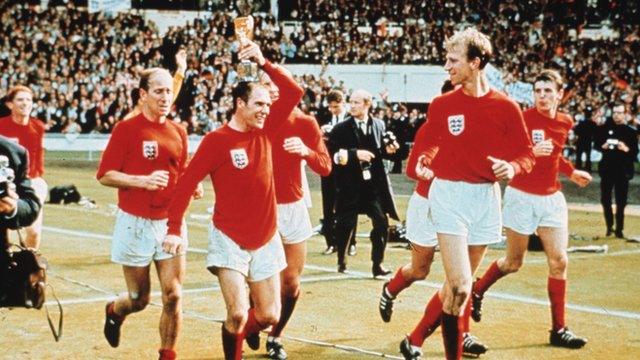
- Published30 May 2014
.jpg)
- Published4 December 2013
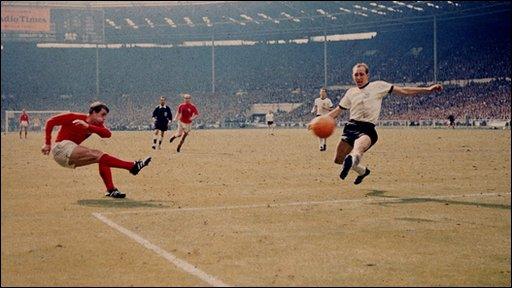
- Published2 November 2018
